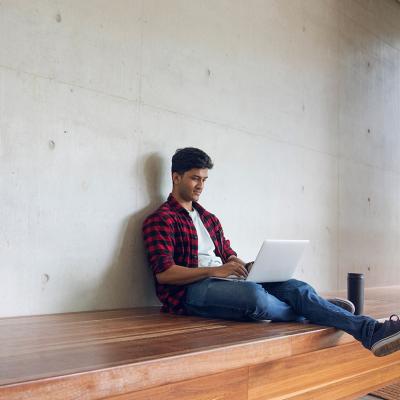So, you’ve realised that your current study habits aren’t quite cutting it. Don’t stress, we’ve all been there. Some students discover it right away after primary school. Others get by just fine until Year 9, 10 or even 11, but then it suddenly becomes clear that effective study habits aren’t optional anymore.
The bad news is, yes, you’ll need to create some good study habits to reach your full potential in high school.
But the good news is it’s never too late to develop these. Plus, creating good study habits now is going to make life much easier when you’re at university or in the workplace.
So, where to begin?
Create your study zone
To give your good study habits the best chance of sticking, you need a dedicated space to practise them.
- Nominate your study space. Whether it’s the family study or a specific corner of your bedroom, it’s best to choose a place where you wouldn’t typically do other activities. This can help you mentally establish your study zone as a space where stuff gets done.
Not every home has a perfect study zone location. If you’re feeling stifled in your bedroom or your siblings make it tricky to find a peaceful place in the house, consider exploring your local library or even a nearby park.

- Make it comfortable. You’ll want decent lighting for reading both screens and notebooks, a sturdy chair to support your back, and perhaps a fan to keep you cool – especially if your study zone doesn’t have a window nearby.
- Remove distractions. Get rid of anything that might interrupt your study habits. This step applies to your laptop as well – close any tabs that aren’t relevant when you’re in the study zone. It’s a big ask, but you could even try leaving your phone out of reach or putting it on do not disturb when you’re studying here. Alternatively, use a study app to make sure your phone is helping instead of hindering your efforts.
Craft a study schedule that suits you

Once you’ve got your study space sorted, it’s time to make sure you actually use it. Without a schedule in place, you’ll find that “later tonight” turns into “later this week” and then turns into “maybe next week” way too easily.
The time zones you’ll want to focus on in your schedule are:
- before school (a great time to squeeze in some study if you’re an early bird)
- after school / early evening
- after dinner / late evening (this is when night owls can make up for skipping any morning study)
- weekends.
Digital schedules work fine for many students, especially if you find reminder notifications helpful. Others find that creating a physical schedule to keep at their desk works better because it’s a constant visual you can refer to. If you put some effort into making your schedule look good (colour coding, anyone?), you may even feel more obligated to stick to it.
There’s no one rule for everyone – you may want to try both approaches and see what suits you.
Remember, even if you write a physical schedule, you should keep it somewhat flexible. As you go through the year, you might find some subjects require more or less of your study time than before. Sticking to your schedule is important, but so is updating it whenever your needs change.
Make sure to include social/sporting activities and downtime on your schedule too. You’ll rapidly run out of study motivation (and ruin your good study habits) if you don’t make time to relax, see your friends and do the things you love.
Study with friends

Independent study is an important part of building good study habits, but you shouldn’t go it alone all the time. Working together with a friend or in a study group can be super helpful.
As long as everyone in the group has the right goals, studying as a team can help you stay focused and motivated. Good company can make boring topics seem at least a little more bearable. And your friends may have different strengths than you, allowing them to help you understand subjects you struggle with (and vice versa).
Maintaining a regular study group or just meeting with a study buddy at the same time each week can also help to cement your study schedule. Repetition and consistency really are the keys to creating good study habits.
You’ll also get to develop teamwork, collaboration and communication skills, which many employers would say are even more useful than study skills.
Experiment with learning techniques

Creating good study habits doesn’t necessarily mean doing the same thing every evening until you go crazy. Mixing up the way you study can help keep things fresh and make the content more memorable. Next time your study routine is feeling a little dull, try out one of the active or multisensory learning techniques below.
Active learning techniques
- Try explaining concepts to other students (great activity for study groups).
- Create flashcards and quiz yourself with them (question or concept on one side, answer or detailed description on the other).
- Pretend to teach a concept to an imaginary audience.
Multisensory learning techniques
- Create your own charts, diagrams or colour-coded notes to visually explain key concepts.
- Conduct experiments or practical examples yourself when possible (e.g. for science subjects).
- Record yourself talking through your notes and play it back (some people absorb information much faster and clearer aurally rather than visually).
If the way you approach your studies is tailored to your learning style and engaging (maybe even fun), you’ll find it’s much easier to stick to your good study habits.
Break up your study sessions

Chaining yourself to your desk for multiple hours is a recipe for disaster. You’ll likely burnout and end up hating whichever subject you were studying – and maintaining any effective study habits is an uphill battle from there.
To avoid this, interject small rests into your study sessions. This can look different from person to person, but it might come down to something like:
- Study for 50 minutes, take a 10-minute walk.
- Work on an assignment for 30 minutes either side of dinner time.
- Make notes for 45 minutes, have a snack and go on TikTok for 10 minutes (perhaps set a timer to avoid scrolling too long), then use the last 5 minutes of the hour to revise your notes.
Ask your teachers for advice
If you find a particular subject boring or hard to understand, firstly, think of your teacher – they have to go through it every year!
Luckily, this means they’re also a great source of wisdom. Ask them what they think is the best approach to studying each topic. They may have some tips and tricks for tackling their specific subject, which you can then layer across your existing study habits.
Establishing good connections with your teachers early can also benefit you throughout high school. It’ll feel more natural to ask for assistance and get feedback on assignments from teachers if you already have a good rapport with them.
Wrapping up
We know starting a new study routine is tough. The first couple of days – or even weeks – might be a struggle as you adjust to your new study patterns. But that’s all the time you’ll need for the behaviour to sink in and become habit, and then it’ll start feeling normal.





